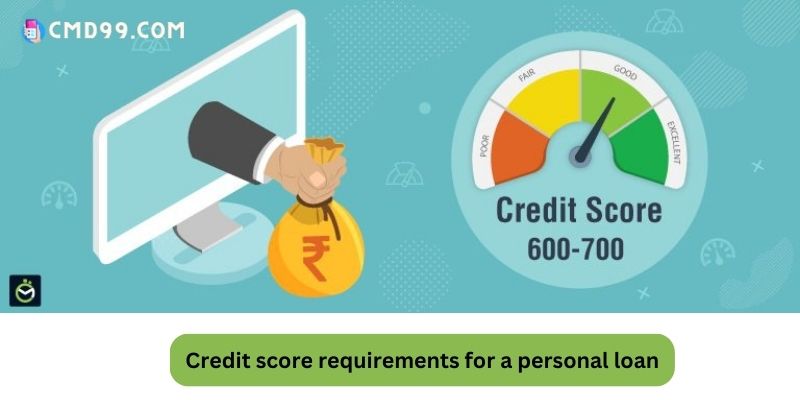For personal loans, different lenders have varied Credit score requirements for a personal loan. While some lenders will accept borrowers with bad credit (a score of less than 630), the majority give consumers with good or exceptional credit (690 and above) preference.
The typical minimum Credit score requirements for a personal loan is between 560 and 660, according to lenders surveyed by NerdWallet. A higher score could be required by some lenders.
Because of your excellent credit score, you could not be qualified or earn a low interest rate. A crucial element in qualifying is your creditworthiness, which is often a combination of your income, debt, credit history, and score. Let’s cmd99.com Find out what loan alternatives you could have based on your Credit score requirements for a personal loan with the calculator below.
What you need to qualify for a personal loan

Just because you have a minimum Credit score requirements for a personal loan by a lender doesn’t guarantee that you will be approved for a loan.
Lenders evaluate applications based on a variety of factors. Some lenders consider other information, such as your college’s location and the industry you work in. Others mostly focus on your credit history and report, as well as your income and debts.
On a personal loan application, most lenders look at the following:
Credit score: The FICO credit rating model is frequently used by lenders, while VantageScore is also used by some. Other lenders claim to base approval on a variety of borrower-related data, including a FICO or VantageScore.
Credit history: On a loan application, lenders prefer to see a lengthy credit history. A lender might state that they desire at least two or three years of credit history, but more is typically preferred. The number of accounts on your credit history demonstrates to a lender how consistently you have made payments. Borrowers who have a history of making on-time payments on a number of credit cards, a mortgage, or an auto loan may be more likely to get approved.
Debt-to-income ratio: Lenders look for applicants who earn enough money to cover their loan payments in addition to their present monthly financial responsibilities. Many people look at your debt-to-income ratio to determine whether taking out another loan would put too much strain on your budget.
Free cash flow: Since expenses like rent, groceries, and gas are not taken into account by your debt-to-income ratio, some lenders look at bank account transactions to determine how much money borrowers have left over after other costs. This is what lenders refer to as “free cash flow,” and the more of it you have, the more likely it is that they will approve your application.
Personal loans for fair or bad credit

Although lenders take into account a number of criteria when reviewing a loan application, they frequently place a lot of emphasis on your credit score.
Those with fair or poor credit are frequently eligible for exorbitant rates that can reach 36%. A lender might allow you for a little loan amount due to your poor credit score.
When deciding whether to grant you a loan, fair-credit lenders may consider factors other than your credit score. For instance, credit unions consider a member’s membership status as well as other details on an application.
How to compare personal loans

When choosing between Credit score requirements for a personal loan lenders, take into account the following factors:
percentages expressed annually. The APR is the sum of the loan’s principal, interest, and other costs. APR allows for an accurate cost comparison of Credit score requirements for a personal loan and other forms of finance.
obtaining pre-approval using a mild credit check. Before applying for a loan, you can pre-qualify with many lenders to get an idea of your prospective interest rate and monthly payments. Pre-qualifying won’t have an impact on your credit score and can assist you in selecting the personal loan that best suits your circumstances.
joint borrowing. Your chances of being approved for a personal loan can be improved by including a co-borrower on your application. Even though not all lenders allow joint loans, having a cosigner with solid income and good credit can help you receive a better rate or a bigger loan. Your co-borrower is also accountable for making payments on a joint loan.
backed loans. Borrowers applying for secured loans must put up collateral in order to be approved. A car, cash in a savings account, or other valuable property that the lender could seize if you default on the loan could serve as collateral. Low credit score consumers may find it easier to obtain a loan or receive a lower interest rate on a secured loan than on an unsecured personal loan.
distinct qualities. Lenders may provide benefits like free career coaching, help developing credit, and assistance with unemployment or other difficult times. If you have the choice between two reasonable loan offers, look for any additional benefits that can aid you in deciding which one is ideal for you.

